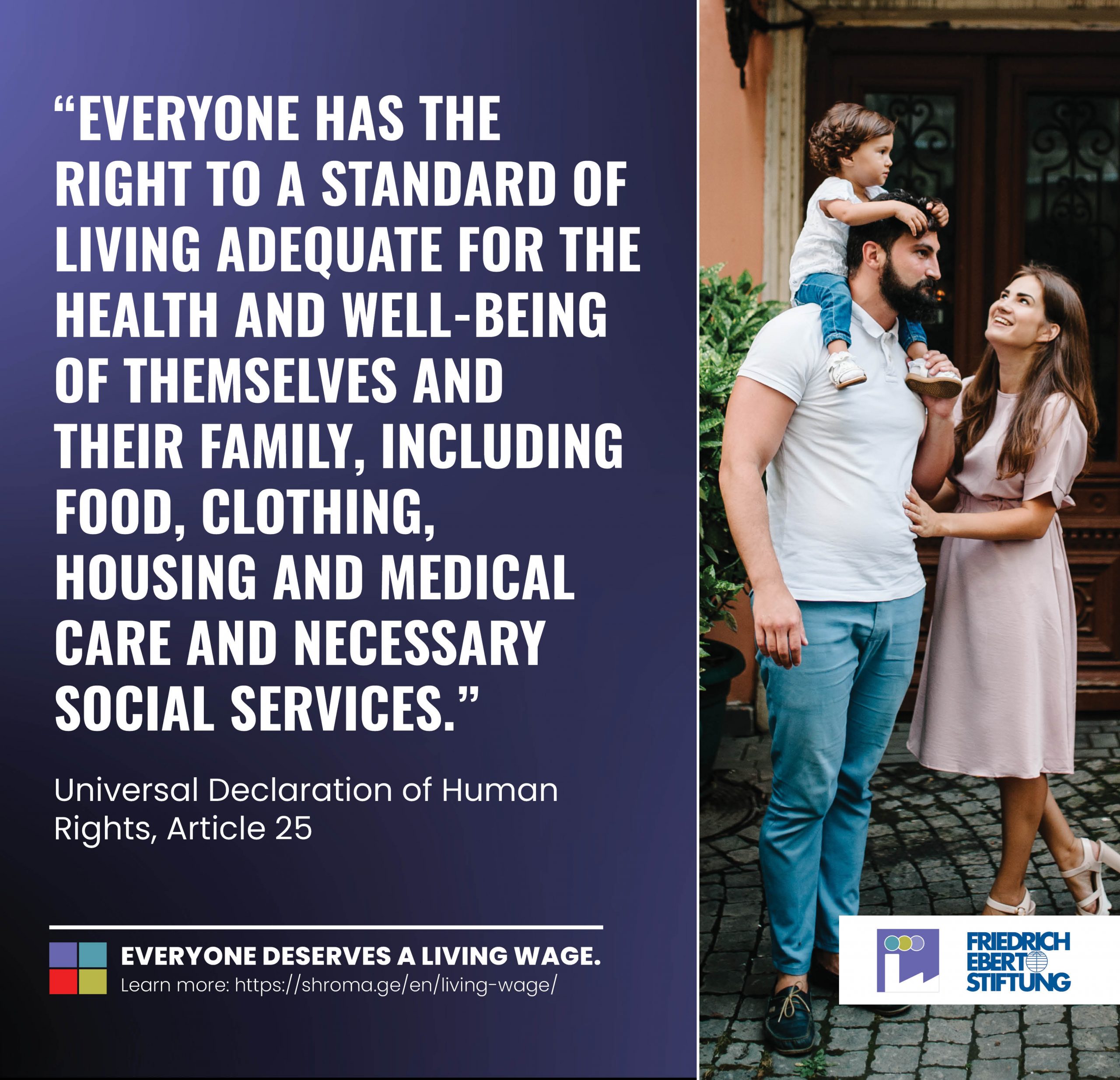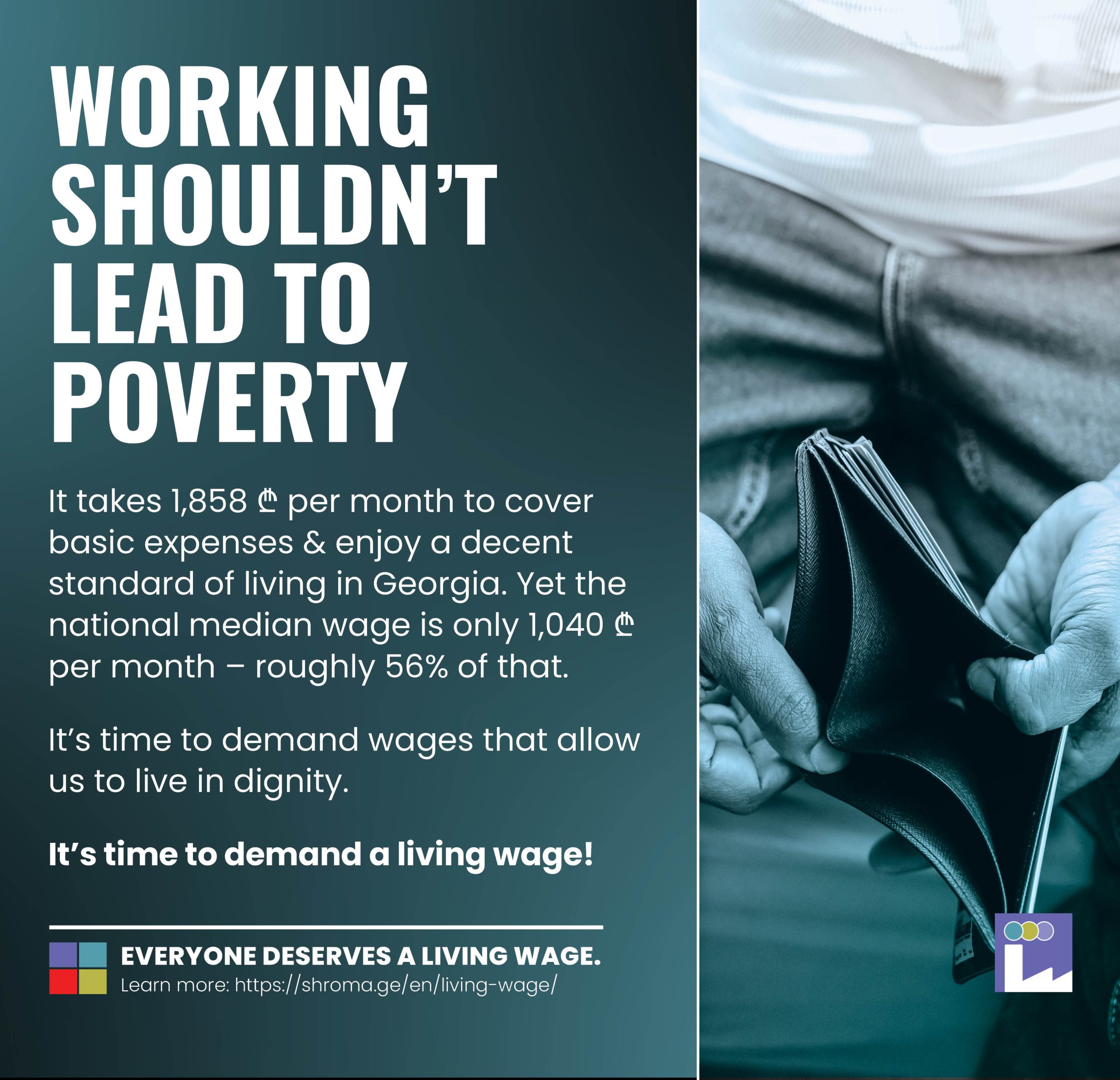Living Wage in Georgia
Current living Wage Estimate: 1,857.75 ₾ per month (April 2024)What is a Living Wage?
A living wage, simply put, is a wage that allows workers to cover their basic needs and enjoy a decent standard of living. It should cover all necessary food, clothing, housing, education, health care, transportation and other essential needs – plus a bit left over for unexpected expenses. It should also be attainable by working normal hours at one job, without overtime.
A living wage is not the same as a “subsistence wage,” which refers to the minimum wage a worker needs to merely survive. Nor is it the same as the minimum wage, which is the lowest remuneration that employers can legally pay their employees by law.
A living wage should cover:
What is the living wage in Georgia?
per month*
*National figure as calculated by the Wage Indicator Foundation in April 2024. For more information on their methodology, see here. For the most current data, broken down by region, see the Wage Indicator Foundation’s living wage page.
This figure is based on
All of Georgia
Including data from urban and rural areas.
One worker in a typical family
Based on World Bank data.
Pre-tax income
Gross before taxes and social charges.
Past living wage Calculations
Per month (calculated by the Wage Indicator Foundation in Oct. 2023)
Per month (calculated by the Wage Indicator Foundation in Oct. 2022)
Why is it important to pay a living wage?
There are many reasons to pay a living wage, but chief amongst them is the issue of basic dignity. Employees who give their time and labor to an employer should be paid enough to cover their basic expenses and afford a decent standard of living. A society where workers are chronically underpaid to the point of destitution is not only cruel and inhospitable, but also unsustainable in the long term. Employers who pay a living wage contribute to Georgia becoming a more equal, just and stable place to live.
The living wage also has huge economic benefits for companies. In fact, it’s one of the soundest investments that a business can make.
First, better wages for workers means they have more money to spend, which helps grow the economy. Second, Georgian companies often complain that they cannot find or retain good staff. Living wages help solve that problem. Better wages lead to increased employee well-being and health, improved loyalty and commitment and less absenteeism. Workers who stay longer in their jobs tend to also get better at those jobs, which can improve productivity.
Finally, paying a living wage can improve a company’s brand reputation by showing consumers that the company cares about their community. This can only help their bottom line.
What are actual wages in Georgia?
Unfortunately, prevailing wages in Georgia are currently far below the living wage. The minimum wage is a paltry 20 GEL per month, and has not been updated since 1999.
According to government data, the median wage – the amount that divides workers into two equal groups – was 1,040 GEL per month as of 2022. That means 50% of workers earn less than that amount.
Prevailing wages vs. the living wage
- 1.1%
Minimum wage
Georgia’s minimum wage of 20 ₾ is equal to 1.1% of the living wage.
- 13.4%
Subsistence minimum*
Georgia’s subsistence minimum of 249.7 ₾ (as of Dec. 2023) for a working age male is equal to 13.4% of the living wage.
- 56.0%
Median wage
Georgia’s median wage of 1,040 ₾ is equal to 56% of the living wage.
- 47.1%
Hotel median wage
Georgia’s median wage of 875 ₾ for accommodation and food service industry workers is equal to 47.1% of the living wage.
Help Improve Our Living Wage Data
Our partners at the Wage Indicator Foundation are constantly collecting data on salaries and cost of living in Georgia to ensure the most accurate living wage data. You can help by filling out the surveys below.
Cost of Living Survey
Also have a look at the Wage Indicator Foundation’s “Salary Check,” where you can see what other workers are making in your field of employment.
Take action!
How can we make a living wage a reality? Unfortunately, there’s no quick and easy solution. Building the society we want will take time, effort and creativity. But here are a few concrete actions you can take to start laying the groundwork for better wages.
Join a Labor Union
The best way to increase your pay is to organize with fellow workers. Labor unions allow workers to team up and act as one, which improves everyone’s bargaining power for better pay and working conditions. Don’t know where to start? We can help.
Vote for Workers’ Rights
Georgia’s politicians haven’t prioritized labor rights in recent years. But that can change if they think the issue is imporant to voters. Vote wisely. Vote for candidates who commit to supporting labor rights and better pay.
Support businesses that pay a fair wage
Not all businesses treat their employees equally. Support the ones that pay a fair wage! Working together, our spending decisions can influence businesses’ behavior.
This page has been created with the support of the Friedrich Ebert Foundation. Its contents are the sole responsibility of the Georgia Fair Labor Platform and do not necessarily reflect the views of the Foundation.


